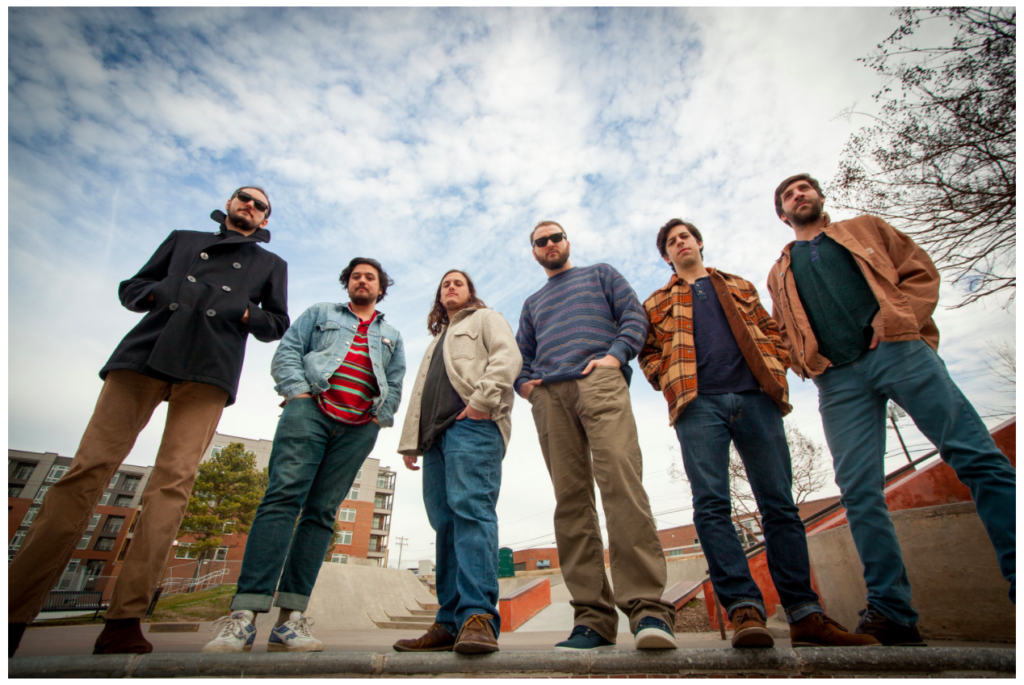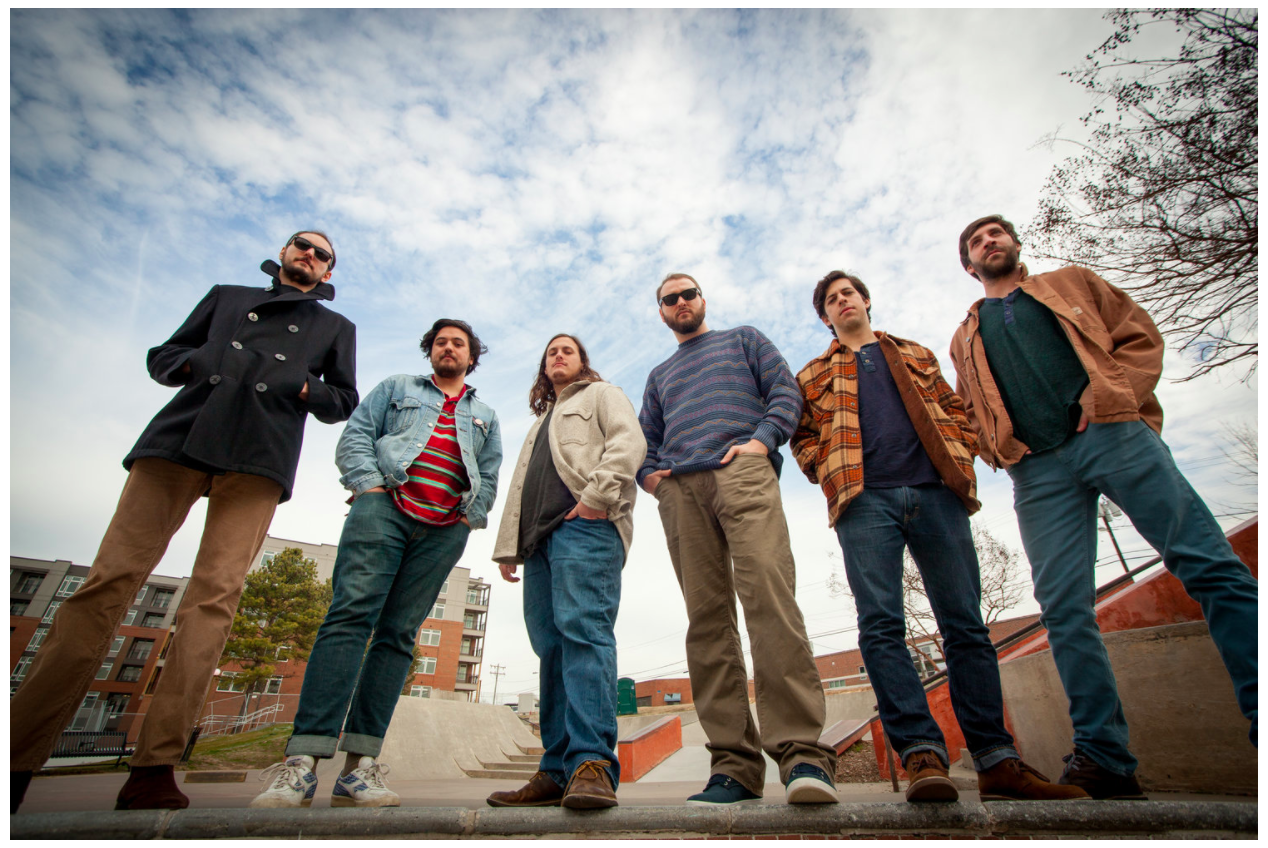Interview: Michael Adkins, Super Doppler
If there is one album that has helped me start this summer on a positive note, it is Super Doppler’s Moonlight Anthems. I got to see Super Doppler at The Great Scott on June 23 and they are high on my list to see again the first chance I get. They are loose and confident and create a genuine sense that music works best when an eclectic group gets together. In early reviews of the album, Super Doppler is compared to The Beatles for their exquisite harmonies and to The Band for their sometimes swampy, southern-rock sound. When listening to Moonlight Anthems, it feels to me like one of the best expressions of what can happen when musicians care less about the constraints of a genre and more about the mood and emotion they’re aiming for with their sound.

Just weeks before putting the album out, Super Doppler made the decision to change its name from Major and the Monbacks, after people drew their attention to the fact that ‘monback’ can have a racist connotation. Support from fans has been strong–it’s nice when you see a band that you like do the right thing. Made up of a group of hometown friends and two sets of brothers in the six-piece outfit, Super Doppler has developed a loyal fanbase in their home city of Norfolk, VA. We got to chat with guitarist and vocalist Michael Adkins a few days after that incredible set at The Great Scott.
RLR: Can you talk about how the band came together a bit? You have two sets of brothers in the band, but it feels like a hometown crew.
MA: It’s pretty simple: besides me and my brother sort of playing music together since we were younger, the rest of the guys grew up same square mile neighborhood. Cole and Neil are twins and obviously they’ve been playing together forever. We’ve all been friends longer than we’ve been in a band. Like, Harry went to church with me, so there’s a bunch of different connections. By the time we hit high school, we sort of gelled from there.
RLR: What got you started with music – and I noticed in the show that you play both guitar and keys, which came first for you?
MA: My brother has been playing drums since he was a little baby and he always had that knack. He was a lot better than me. I’m sort of a “Jack of all trades, master of none,” and he’s a real master of his instrument. It was orchestra in fifth or sixth grade before I realized I had any sort of talent. I started playing double bass in orchestra, and that’s a pretty smooth transition to guitar. About the time I hit middle school, is when I got interested in jamming. It was seventh or eighth grade before I got good enough to play with my brother. Everybody else is about the same and they’re a lot of local connections, like the same guy taught Cole and Neal and even gave Brian a few lessons on drums back in the day.
RLR: Can you talk about your songwriting process individually, and then also as a band? Do you all start with hooks and melodies or with lyrics – how does a song go from idea to a composition?
MA: It’s pretty evident how quickly I work, since I have one song on this album. I had two tracks on the last one. I write very deliberately, very slowly. I can’t sit down and think, “Today I’m gonna write a song.” I’ll get a thought in the shower, or spark of inspiration. It’s random and I’ll try to hold onto that piece and glue other parts on until I’ve got something. The ones that I do we’ll decide on for a while, and we’re so used to playing them that by the time we record them, we just go in and knock it out. That’s the way “Condition” was on this album. We went in and did that first just because we’d been playing it so long and we were really comfortable laying it down.
So that’s basically an extra contrast to how Harry and Neal write songs. Harry’s a little more piece by piece, like me. But Neal can sit down and can just churn out a good rocking, Americana tune. That’s just what he does compulsively.
MA: It’s best if the picture is barely complete by the time they bring it to us. Since everyone has input, it’s just easier. We’ll make little demos and bring them to practice. And after that, it’s all discussion, it’s all feeling it out. We function pretty well as a democracy, but it takes a long time. The ones that are good, everyone falls into and makes it their own. Obviously the songwriter gets a little more say, but you try not to abuse that power. I definitely have a lot of input on other people’s songs. It’s a tedious thing. Any time democracy works well, it’s pretty tedious.
RLR: I’ve seen Super Doppler described as a ‘democratic’ band. It sounds like for you it’s about process. Do you end up having habits or routines that give it structure?
MA: It’s pretty much just constant argument. It can work well in other bands when you have 1-2 people telling everyone what to do. But when you’ve been friends for fifteen years, and have been playing in a band together for the past 10 years, these aren’t strangers you’re obliged to be polite to. You can be rude and joke around, and at the same time, everybody deserves their say because we’ve been in this together for a long time. We feel like we owe it to each other, to hear each other out. And we try to be suggestive, and not demand things from each other.
RLR: What do you think you learned from working with Matthew E. White on this album?
MA: It was a little different for him, because he’s used to getting more of a skeleton from singer-songwriter, and filling in instrumentation. He didn’t really have to do as much of that with us. When we met, he was excited, because it seemed like we had a pretty good head on our shoulders and an idea of what we wanted it to sound like. He helped us shape it the way we wanted to; he went over everything with a fine tooth comb and he settled some of the debates about the structure of some songs. He was also a great coach because we wouldn’t have been able to accomplish what we did as fast as we did without him.
Time is literally money in the studio. So being able to have a gameplan, an outline and a schedule. We already knew we needed that, but we were done with heavy stuff after nine days, so we ended up with half a week to mess around and tweak it. And it was invaluable to us to have a mediator of sorts. When it comes to the studio, the finality of it all, you want to make sure you’re getting things down the way you want, so people can have more heated opinions.
We also had a great engineer, who had a great relationship with Matthew. Adrian Olson, at Montrose Studios in Richmond. He had an influence on the sound, but also on the professionalism and polish of the album.
RLR: Your band recently changed its name from Major and the Monbacks, at a time when releasing a new album. How did you all come to that decision and how has the response been from fans?
MA: It’s hard to tell one part of the story without telling the whole thing, and this would be great gossip or drama if it wasn’t happening to me. There was stuff beyond our control that forced us to part ways with the label. With regards to the name change, we obviously didn’t know when we named the band that there was any negative epithet. When we found out it did, it seemed so obscure and we had played for thousands of people and never had a problem. We had obviously never used it in a negative way.
But we changed the name because if this usage exists, and it’s going to offend people, why not avoid that? And if we’re not good enough musicians to survive on another dumb name, then what’s the point? It’s not like the first name was a great name anyway.
We’ve had nothing but resounding support from everybody. And that describes our dedicated fanbase. They’re very loyal, supportive people. We figured the best thing we could do would be to not miss a beat at all–to keep the same release date, and rush order a bunch of CDs. We kept the tour and we’re just trying to carry on and move forward as professionally as possible. A lot of our fans have been waiting to hear this stuff for a long time, and we felt like we owed it to them.
MA: Living comfortably is the best trick to not hate it so much that you never want to do it again. We have a pretty new van, with freshly tinted windows and working A/C and our trailer hasn’t fallen apart yet. We’ve got friends everywhere, so hopefully accommodations won’t be hard to come by. But like I said, we’re a bunch of friends who bitch and moan at each other, so that always happens on the road. We bring a ton of books to keep everybody occupied. This will be the longest continuous stretch we’ve been away from home, but hopefully we’ll be so sunburnt and tired by the end that we’ll be alright.
Super Doppler is on a national tour and you can find tour dates here. And definitely add Moonlight Anthems to your summer playlist.

